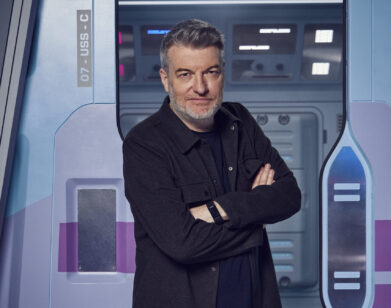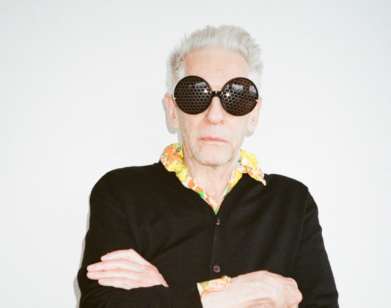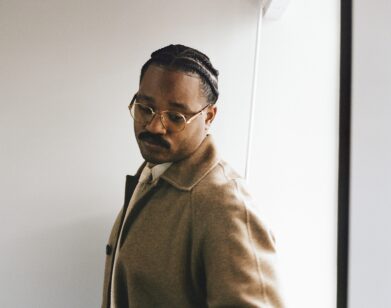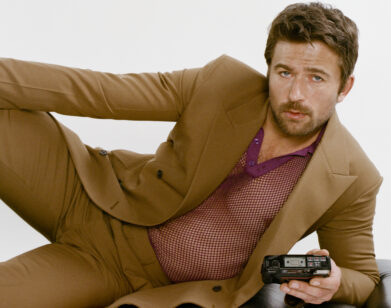The Misanthrope
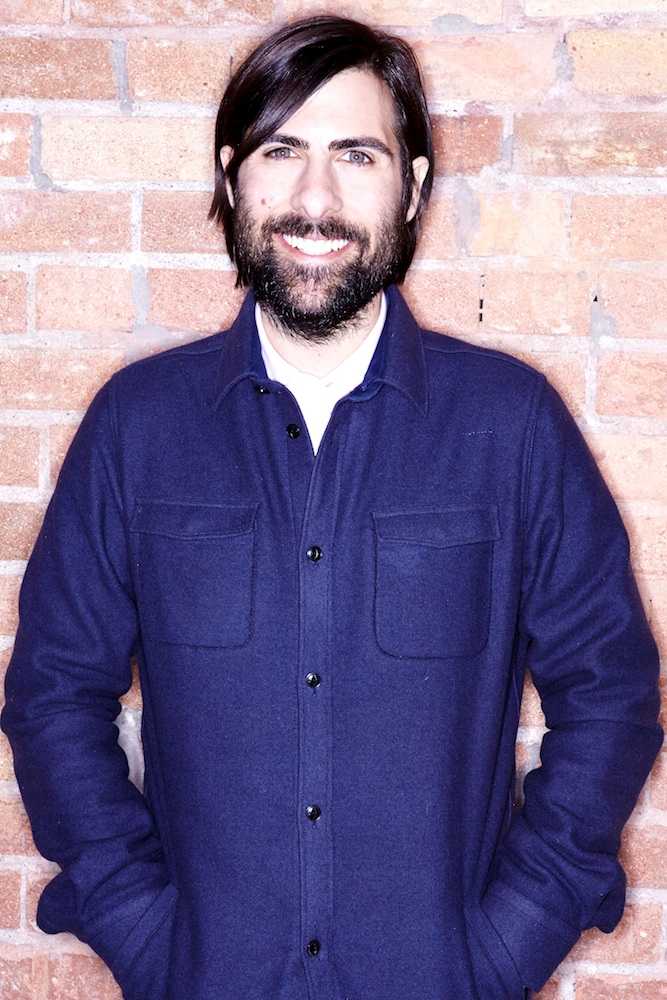
ABOVE: JASON SCHWARTZMAN IN PARK CITY, UTAH, JANUARY 2014. PHOTO BY KATIE FISCHER
“Obidant entered the code: 1121 + 1. Two beeps and the little light turned from red to green…” So begins Obidant, the second novel from fictional fiction author Philip Lewis Freidman.
There is arguably no protagonist in Listen Up Philip, the third feature from writer and director Alex Ross Perry (Impolex, 2009; The Color Wheel, 2011). The film begins and ends focused on the titular character, a talented but egotistical young writer played by Jason Schwartzman. In between, however, Philip disappears and the film’s focus meanders towards his ex-girlfriend, Ashley (Elisabeth Moss) and his mentor, a curmudgeonly author named Ike Zimmerman (Jonathan Pryce). As Ashley says, it is as if Philip were a figment of our imaginations.
This unconventional narrative trick was inspired by William Gaddis’ novel The Recognitions. “In the book, which is very long, the main character leaves for 400 pages,” explains Jason Schwartzman. “You see how he’s affected everybody through his absence… That was a big part of it for Alex. This is about how all these people affect each other, but Philip has been a bit of a wrecking ball. You’re seeing everybody dealing with the broken glass that’s been left behind.”
Listen Up Philip, which premiered last week at Sundance, is certainly an unconventional film. With his trademark deadpan delivery, Jason Schwartzman’s Philip manages to be both unlikeable and highly engaging. Abrasively blunt, Philip has as many quotable lines as Schwartzman’s character in Rushmore (1998), Max Fischer.
JASON SCHWARTZMAN: Will this be written out Interview style?
EMMA BROWN: As a Q&A? Yes.
SCHWARTZMAN: I like that—it’s my favorite. Do you know the books by Christina McKenna?
BROWN: No, I don’t.
SCHWARTZMAN: You should buy them. Immediately. She has this book called Book of Changes. She’s the greatest. She interviews people and she’s interviewed everybody—Lou Reed, every great interview. These will be your favorite books. You will want to interview her for Interview magazine.
BROWN: How did you discover her?
SCHWARTZMAN: I know her through a friend of mine named Tosh Berman who’s a writer and he has a small publishing house in Los Angeles called TamTam Books. He put out the Serge Gainsbourg book last year, and all the Boris Vian books. He’s amazing.
BROWN: I was actually reading an old Interview interview with Bill Murray and Wes Anderson about Rushmore from 1999.
SCHWARTZMAN: Oh really?
BROWN: I never put it together that Rushmore was your first film.
SCHWARTZMAN: Yeah, it was.
BROWN: Was it nerve-wracking?
SCHWARTZMAN: [laughs] Yeah. It was frightening. It’s weird, but I was 17, so I think about that time in terms of the school year. It was mid-October when I got the part. I was just beginning my senior year of high school, I was making a record with my band and trying to figure out how I could get into college in L.A. so I wouldn’t have to leave town. Then I got the part. One day I was at school in a science class and three weeks later I was in Houston, about to start a movie with arguably the greatest, Bill Murray. It was very intense for me. Everyone loves him because his work is great, but also because they have a personal connection to some movie of his. I met him the night before shooting, and we rehearsed the scenes a few times. It was very, very nerve wracking. But I couldn’t have gotten through it without him. He really took me under his wing. I had never acted in my life. It was the first script I had ever read.
BROWN: Good choice.
SCHWARTZMAN: Well, it wasn’t my choice. [laughs] Every day, I wasn’t thinking about trying to be good in the scenes, I trying to think about not being terrible in the scenes. I was so overwhelmed.
BROWN: What Bill Murray film do you have a personal connection to?
SCHWARTZMAN: Obviously Ghostbusters, What About Bob?—I even have a shirt that says, “Don’t hassle me, I’m a local”—Groundhog Day, Scrooged. I also like The Man Who Knew Too Little and I love him in Little Shop of Horrors. People don’t talk about that one.
BROWN: Your character in Listen Up Philip has some great lines. Do you have a favorite one?
SCHWARTZMAN: There are some lines that when I read the script, I was like, “Yikes. That’s kind of a tough thing to say to somebody.” Like he says, “I hope this will be good for us, but especially for me.” And then there’s another line in the movie that I like, where Philip, he’s about to get his photo taken, and he turns around and says, “I know, what an asshole, right?” I think it’s interesting, ’cause he’s aware that he’s being not being right. He is aware of it, and we were aware of it filming. It was intended to be a thing where he knows he’s doing it. When Alex and I were talking about it, we were talking about how coldness, disconnectedness, was like a drug he was trying in the beginning. Without realizing it, he became addicted. Because the narrator says at the beginning of the movie—
BROWN: —that it was the first time he’d really spoken to someone like that.
SCHWARTZMAN: Yeah. Alex always says, “Oh, I never think about the fact that he’s a writer, to me he’s just a miserable person.” But when Alex and I were first talking about the movie, he said, “This is sort of about a guy who’s had success and is mishandling it.” Yesterday he was saying, “When I got back from promoting The Color Wheel (2011), I met all these great directors that I loved and had lunch with them. And I could recognize a part of myself that came back to all [my other friends] that were lazy and not doing things with their lives, and part of me was angry with them. Obviously they’re still my friends, but what would happen if I just kind of laid into all of them?” I was interested in that, because I think that everybody has that balance of good, nice, moral, immoral, incorrect, and negative. This person is just highly out of balance right now. I think he’s just in a low point. I think they’re all in a low point.
BROWN: The one person Philip respects in the film is Zimmerman.
SCHWARTZMAN: It was cool, because we shot the film in chronological order. In the first scenes with Philip and Ike, Philip’s quite of nervous—there’s a little bit of anxiety. Then the last scene in the movie between Philip and Ike is the last thing we shot, so I think we got to know each other more. I realized Elisabeth and I got together for two weeks, almost every day, and we’d have coffees and talk about these characters. [With] Ike, we didn’t talk at all. I think that was more, proper—these guys are trying to figure out each other. It was important that Philip be a good writer. Zimmerman is interested in being around him; he does see himself in Philip a little bit. Maybe there’s a little bit of a power play, “Inviting you to my place, something that you will probably never get to buy in your life.” He does kind of put him down sometimes—these odd little digs. But I do think he’s also getting some juice out of being with this younger guy.
BROWN: There is an excerpt from Philip’s novel in the press notes. Did you write that? Or did it come with the script?
SCHWARTZMAN: I wrote it. I would email Alex excerpts from his book and say, “Is this like the kind of writer Philip is?” So that excerpt is actually four different kinds of excerpts. I was thinking, “Maybe he’s more like Ben Marcus. Or maybe he’s more surreal, like Irving Welsh.” Did you ever read a book by [Georges] Perec?
BROWN: Yes.
SCHWARTZMAN: You’ll be reading and all of a sudden there’s a mathematical equation. I started to think maybe he’s in that brand—not like J.D. Salinger, where it’s just prose. Maybe, all of a sudden, there’s a diagram of a building. If you have the time, it’s nice to play these games and make all these mistakes. I’d email Alex excerpts and he included some of them in these press notes. It was just fun for the both of us. I don’t have a huge social life, so I had no excuse [not to]. [laughs]
For more from Sundance 2014, click here.

